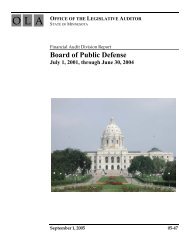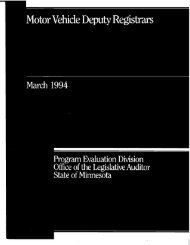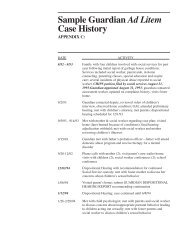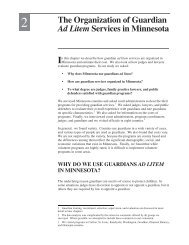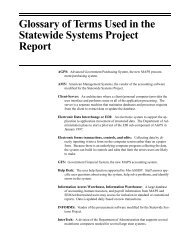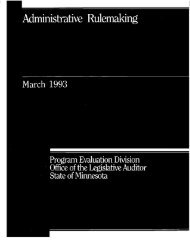Occupational Regulation - Office of the Legislative Auditor
Occupational Regulation - Office of the Legislative Auditor
Occupational Regulation - Office of the Legislative Auditor
You also want an ePaper? Increase the reach of your titles
YUMPU automatically turns print PDFs into web optimized ePapers that Google loves.
84 OCCUPATIONAL REGULATION<br />
WASHINGTON<br />
Washington<br />
has enacted a<br />
sunrise law and<br />
a uniform<br />
disciplinary<br />
act for health<br />
pr<strong>of</strong>essions.<br />
It also has<br />
centralized <strong>the</strong><br />
administration<br />
<strong>of</strong> <strong>the</strong> health<br />
boards.<br />
The most interesting aspects <strong>of</strong> occupational regulation in Washington relate to<br />
<strong>the</strong> health care pr<strong>of</strong>essions. Washington passed three major reforms in <strong>the</strong><br />
regulation <strong>of</strong> health care pr<strong>of</strong>essions during <strong>the</strong> 1980s. First, in 1983, Washington<br />
passed a sunrise act that applies to scope <strong>of</strong> practice proposals as well as proposals<br />
for regulating previously unregulated pr<strong>of</strong>essions. Similar to Minnesota’s sunrise<br />
statute, Washington’s sunrise act stipulates that when regulation is deemed<br />
necessary, <strong>the</strong> legislature should enact <strong>the</strong> least restrictive form <strong>of</strong> regulation;<br />
however, Washington’s act explicitly provides <strong>the</strong> three options <strong>of</strong> registration,<br />
certification, and licensing. 7 The act has been successful in limiting <strong>the</strong> number <strong>of</strong><br />
new occupations regulated in Washington; since it was passed only one health<br />
pr<strong>of</strong>ession has become licensed. Two problems were noted with Washington’s<br />
statute. One was that <strong>the</strong> act mandates sunrise reviews by both <strong>the</strong> Health Board<br />
and <strong>the</strong> Department <strong>of</strong> Health. This two review system has been somewhat<br />
problematic since <strong>the</strong> two agencies receive different information and sometimes<br />
<strong>of</strong>fer different recommendations. The o<strong>the</strong>r problem is that <strong>the</strong> statute mandates<br />
<strong>the</strong> reviews to be narrowly tailored to <strong>the</strong> specific proposals at hand. This is<br />
problematic because <strong>the</strong> proposals can undergo substantial change in <strong>the</strong> time<br />
between <strong>the</strong> beginning <strong>of</strong> <strong>the</strong> reviews and <strong>the</strong> time at which <strong>the</strong> reviews are<br />
presented to <strong>the</strong> legislature.<br />
The second major reform was in 1986 when Washington passed a Uniform<br />
Disciplinary Act (UDA) for health pr<strong>of</strong>essions. As its name suggests, <strong>the</strong> UDA<br />
requires boards to take similar disciplinary actions for similar violations. The<br />
UDA also broadened <strong>the</strong> range <strong>of</strong> disciplinary actions available to <strong>the</strong> boards.<br />
Prior to <strong>the</strong> passage <strong>of</strong> <strong>the</strong> UDA board disciplinary action was largely limited to<br />
<strong>the</strong> harsh measure <strong>of</strong> license revocation. Finally, <strong>the</strong> UDA also requires <strong>the</strong><br />
boards to report to <strong>the</strong> Legislature periodically on disciplinary actions. Currently,<br />
<strong>the</strong> Washington State Department <strong>of</strong> Licensing is drafting a proposal for a similar<br />
UDA which would cover all non-health pr<strong>of</strong>essions. The proposed legislation<br />
would add to <strong>the</strong> existing practice acts which govern each pr<strong>of</strong>ession by creating a<br />
uniform system <strong>of</strong> sanctions and remedies covering all regulated pr<strong>of</strong>essions. 8<br />
A third reform came in 1989 with <strong>the</strong> creation <strong>of</strong> <strong>the</strong> Department <strong>of</strong> Health. At<br />
that time <strong>the</strong> administrative, staffing, and budgetary decisions <strong>of</strong> <strong>the</strong> health-related<br />
boards were moved from <strong>the</strong> Department <strong>of</strong> Licensing to <strong>the</strong> Department <strong>of</strong><br />
Health. The boards retain full rule-making authority.<br />
7 Revised Code <strong>of</strong> Washington §18.120.010. Minnesota’s sunrise act, Minn. Stat. §214.001,<br />
explicitly provides only two levels <strong>of</strong> occupational regulation: licensing and registration (<strong>the</strong> latter<br />
defined in Minnesota statute as title protection).<br />
8 The proposed Uniform Disciplinary Act for Non-Health Pr<strong>of</strong>essions will not be presented<br />
until legislative session year 2000. Ano<strong>the</strong>r mechanism for attaining regulatory uniformity in<br />
Washington is found in <strong>the</strong> “uniform administrative provisions” (RCW §18.122), which provides<br />
groups seeking occupational regulation a template for legislative proposals. Among <strong>the</strong> reported<br />
advantages <strong>of</strong> <strong>the</strong> template is that <strong>the</strong> consistency in format makes it easier to analyze proposal<br />
content.



